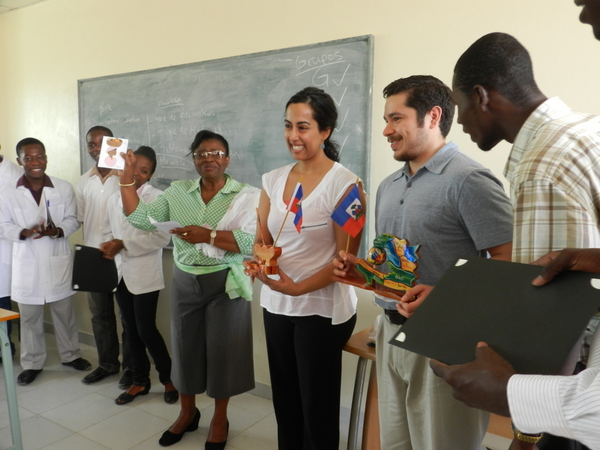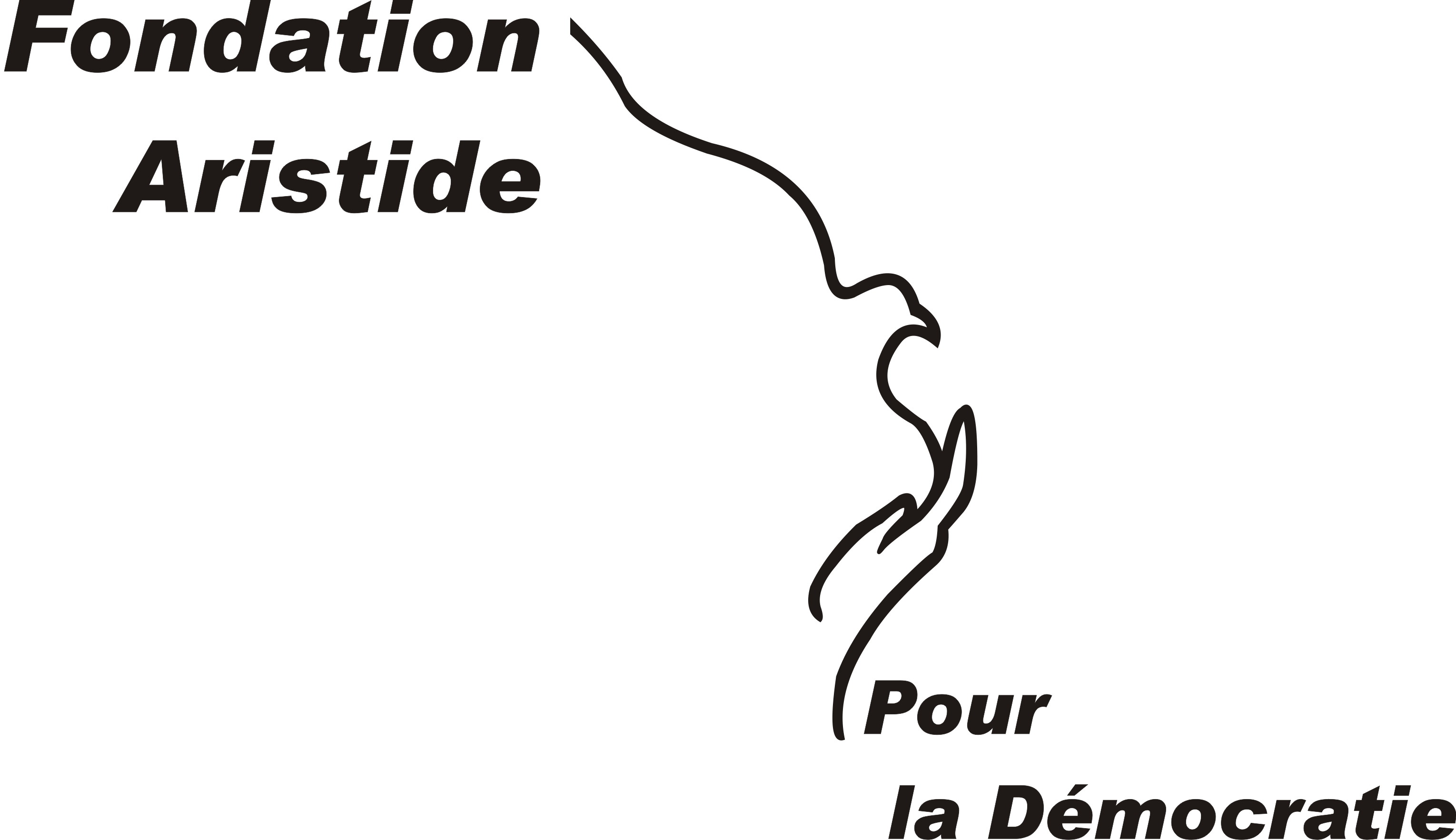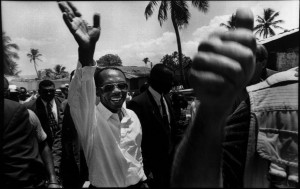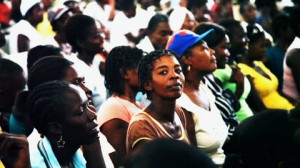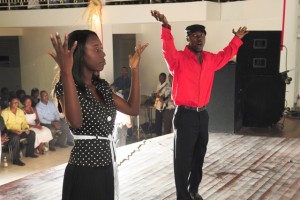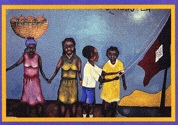UNIFA Medical School Enters its Second Semester
The second semester of Medical School at UNIFA began on January 9. After three months of intensive Spanish language training, core first year medical school courses began: anatomy, embriology, histology, medical ethics, physiology and bio-chemistry. Haitian doctors Francis St. Hubert, Pierre Gaetjeans and Lantz Etienne joined their Cuban counterparts on the UNIFA medical faculty. Newly purchased laboratory equipment – microscopes, prepared slides and anatomical models, also arrived mid-semester as teaching supplements for the first year curriculum. The 126 students, initially divided into 4 sections for were put into two, groups, Group A and B. Students continue their study of Spanish in the mornings, while the core Medical School courses are taught in the afternoon. An English course has been added, to provide proficiency at a time where English is increasingly gaining ground in Haiti; and a French writing class (two class hours a week) devoted to strengthening writing skills has also been added.
Students are in class from 7:30 to 5:00, five days a week. Newly installed internet access will broaden research capacities and the availability of online teaching material.
Visiting Professorships: Partnership with Physicians for Haiti
Since its founding in 2001, one of UNIFA’s goals was to open its doors to ideas and teachings beyond Haiti through hosting international lecturers. That is why 22 professors’ residences were constructed less than a 10 minute walk from the main classrooms and administration building, and in close proximity to the student dorms. In early December 2011, Dr. Aristide met with six members of Physicians for Haiti, a Boston-based health organization, to explore the possibility of a partnership that could begin to bring visiting professors and lecturers to UNIFA on a rotating basis. The founding members of the group understood that the long term solution to Haiti’s health crisis – worsened by the earthquake – lay in training more Haitian health care professionals. They committed to focusing their skills and energy on medical education in Haiti on the principles of “partnership, bidirectional education and health equity.” On January 19, 2012, a memorandum of understanding was signed to implement a partnership for medical education between UNIFA and Physicians for Haiti. One of the key terms of this agreement is a commitment by the organization to create a pool of visiting instructors who will teach medical students at UNIFA. During their stay, these visitors will be hosted by UNIFA. The teaching program will be monitored and evaluated by both institutions. In addition, the agreement signed provides that the two institutions will collaborate on research projects.
Dr. Lopa Basu, the first visiting instructor recruited by Physicians for Haiti arrived in March. She holds a masters degree in public health and is currently in the medical residency program at Johns Hopkins University. Prior to that, she was a research associate at the Johns Hopkins Center for Public Health & Human Rights. Dr. Basu taught the first half of a two week class (20 class hours) titled: Introduction to public health and social determinants of health. During the second week, she was joined by Dr. Ruben Frescas, who also holds a masters degree in public health and was a teaching assistant at Loyola University School of Medicine. The focus of Dr. Frescas’ lectures was the social determinants of health.
Professors’ residences
Dr. Lopa and Dr. Frescas spent their two weeks as visiting lecturers at UNIFA in one of the eight newly renovated professors’ residences on campus. The 22 residences are individual bungalows with a kitchen, living space and 2 to 3 bedrooms. The residences, like the dorms, were once occupied by victims of the January 20, 2010 earthquake seeking shelter. From July to September UNIFA worked with the families in the professors’ residence, the local magistrate’s office and various international groups to help these individuals relocate. Renovations started in December 2011. Cuban instructors and an attendant reside in five of the other buildings.
Cafeteria service
The long days on campus (7:30-5:00) necessitated offering students, faculty and staff food services at an affordable price. Space was identified for a cafeteria and estimates received on the cost of equipment and construction. However, UNIFA was not financially prepared for this expense. Evelyn Perrard, UNIFA secretary general and former director of the country’s national school lunch program could not wait. With a small staff of two cooks, 2 assistants, four servers and someone at the cash register. Mme Perrard set up a breakfast and lunch program capable of serving the entire UNIFA community. Balanced meals that include a fresh fruit, a vegetable and as much local produce as possible, are prepared in one facility and carried to the auditorium where chairs and tables are set up to temporarily serve as a cafeteria. Breakfast costs 20 gourdes (about .50 USD), lunch 60 gourdes (1.42 USD); or both meals for a discounted 75 gourdes (1.78 USD).
By June the Medical School at UNIFA will have completed its first full academic year in since the coup of 2004 and the earthquake of 2010. It has taken tremendous hard work and persistence on behalf of all the students, staff and faculty to begin once more under very difficult circumstance and with limited resources. We would like once more to thank Partners in Health and the Haiti Emergency Relief Fund for their financial support. Students fees fund a portion of UNIFA’s budget, but we count on supporters internationally to fill in the rest. If you would like to support UNIFA you can make a tax deductible donation via the Partnership for Education, Democracy and Health in Haiti. Donations can be sent to: Partnership for Education, Democracy and Health in Haiti, PO Box 490271, Key Biscayne, Florida 33149.

